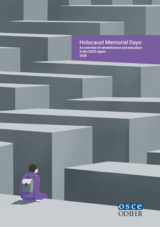In close co-operation with civil society, ODIHR raises awareness about anti-Semitism and its impact, and has developed educational tools to address this challenge. ODIHR also enables the exchange of good practices about Holocaust remembrance and education.
OSCE participating States first condemned anti-Semitism in 1990. This includes verbal harassment, hate speech and violent attacks targeting Jews and Jewish institutions, neo-Nazi activities and Holocaust denial.
OSCE participating States are committed to preventing and addressing anti-Semitism through a comprehensive set of measures.
ODIHR has been tasked with collecting information about, and reporting on, anti-Semitic incidents and hate crimes across the OSCE region. ODIHR compiles this data on its Hate Crime Reporting website and works with civil society to better record and report anti-Semitic incidents.
ODIHR also works to raise awareness on current challenges and effective responses to anti-Semitism by facilitating the exchange of good practices among governments, educators, civil society and Jewish community organizations from the OSCE region for preventing and responding to anti-Semitism. ODIHR also created specific teaching tools with partner organizations, and our Words Into Action project emphasised addressing the security needs of Jewish communities, countering anti-Semitism through education, and fostering coalition-building among different communities.



